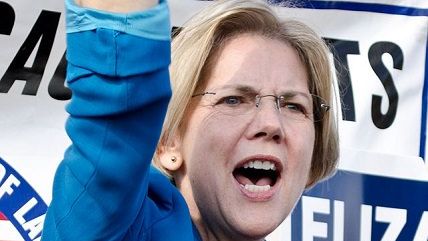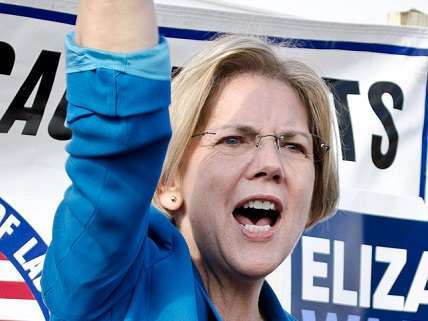Did Republicans Kill Warren's Loan Bill Because They Hate Poor Kids?
Expect to see Democrats campaigning on that.


Republicans blocked Sen. Elizabeth Warren's (D-Mass.) student loan bailout bill yesterday, and Democrats have already jumped on it as a campaign issue. That was probably the left's plan all along, given that the bill would have raised taxes on the rich and never had any chance of passing the House of Representatives.
"We have the broad support from the American people and that is going to play very well for us as we move towards November—and that's the bottom line here," said Sen. Chuck Schumer (D–N.Y.).
Others echoed his comments, according to Politico:
"With this vote, we show the American people who we work for in the United States Senate: billionaires or students," Warren said on the Senate floor on Wednesday.
And "instead of fighting for working families and college affordability, some members of Congress are fighting to keep their millionaire constituents from paying their fair share of taxes," National Education Association President Dennis Van Roekel said in response to the Senate's action.
Even President Obama seized on the Republicans-don't-care-about-poor-kids rhetoric:
"We want a Republican Party that can function and with which we can negotiate and compromise and help move the country forward," he said. "But unfortunately, that's not what we're seeing in Washington right now from the Republicans … How could we not want to invest in these kids? … Why wouldn't we want to make sure that college was affordable and that they weren't burdened with $30,000 or $50,000 or $70,000 worth of debt? Why wouldn't we want to create an economic environment in which in their first job, if they're working full-time, they're not living in poverty, and that they can save a little bit and they're getting a fair wage?"
Never mind that Republicans did work with Obama last summer on student loans, approving a bipartisan deal that indexed loan interest rates to Treasury bonds rather than the whims of Congress. The major thorn in the president's side back then was actually Warren, who didn't want to accept anything short of substantial debt forgiveness for student borrowers.
The trillion dollars of loan debt collectively held by students and graduates is an undeniably tricky problem. But wiping away that debt is a bad fix. Such a solution punishes taxpayers for the bad judgements of borrowers, encourages more reckless borrowing, and sends universities the message that they can raise tuition even higher.
Still, expect to see lots of Democrats campaigning on the notion that Warren's debt deal would solve all of millennials' financial problems if only those mean Republicans would back off.
Reality is of course a little more complicated. In a recent column, Bloomberg View's Megan McArdle explained why student loan debt is actually a problem of the privileged:
It's good to remember, as we discuss these plans, that people with college degrees are the best-off people in the U.S. They are a cognitive elite with substantially more earning power than almost anyone else, unless that someone else can throw a mean fastball, dunk or get their body fat down to less than 4 percent by the time their feature film is ready to shoot. It's hard to see why we would take money from other people and give it to this group.
People with lots of student loan debt and low earnings are, of course, a particularly visible group to journalists, who cluster in expensive cities and know a lot of expensively educated people. It's not surprising that a huge number of articles get written about this problem. But it's still disproportionately a problem of the affluent. And the government already spends quite a lot of money on benefits for the affluent.
If we wanted a program to help the majority of the population, we'd offer loan guarantees to help poor people get access to reliable cars so that they could have a better shot at getting -- and keeping -- a well-paying job. I know you're thinking that sounds crazy, but if you spend any time listening to the problems of working-class people -- many of whom lacked the opportunity, the interest or the academic ability to get through college -- you'll get an earful about the problems of driving a beater that constantly breaks down. A small amount of capital could make a much bigger difference in their lives than extra student loan relief for middle-class college kids would.
I say "extra" because we already have a very generous income-based repayment system for student loans. The IBR program allows you to hold your loan payments to no more than 15 percent of your discretionary income and stretch out the payment term to 25 years, after which any remaining debt is forgiven. To be sure, you have to have a partial financial hardship to qualify -- but the "financial hardship" is that . . . your payments on the standard plan would be more than 15 percent of your discretionary income. As someone whose initial loan payments were closer to 50 percent of her discretionary income, I can testify that that's a pretty sweet deal.
